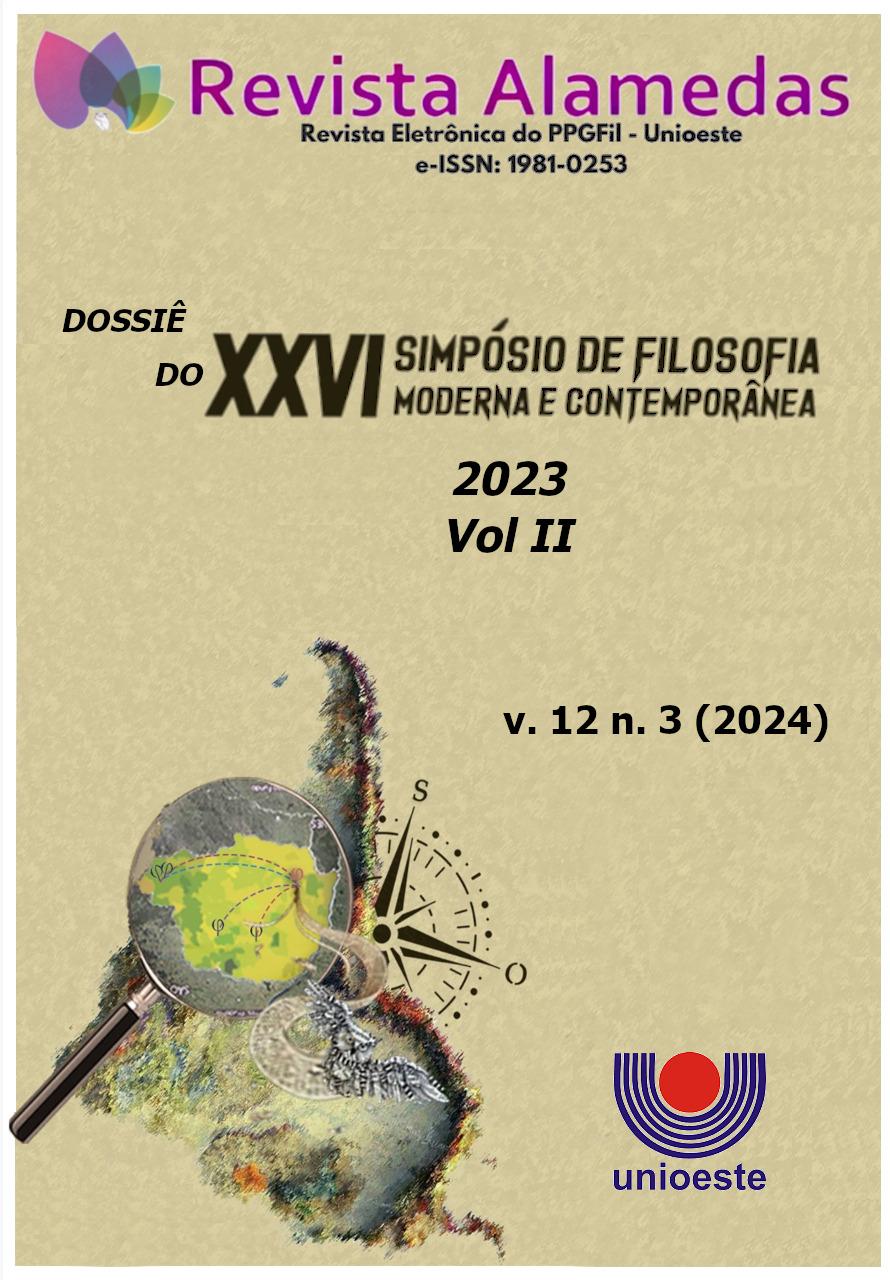Schopenhauer
a história e a lei da motivação
DOI:
https://doi.org/10.48075/ra.v12i3.33211Palavras-chave:
História, Lei da motivação, SchopenhauerResumo
O objetivo desse texto é analisar a lei da motivação como organum do saber histórico na filosofia de Schopenhauer. Trataremos da lei da motivação como razão que determina os limites do modo de saber histórico. Nesse sentido, a nossa investigação tem como pauta a compreensão e a descrição da lei da motivação na concepção de história de Schopenhauer. Entendemos que a história tem “os fatos humanos ocorridos em seu conjunto como problema, e a lei da motivação como órganon” (Schopenhauer, 2005, p.73). À afirmação de que o modo de saber proporcionado pela história está subordinado a uma lei anterior contrapõe-se, em certa medida, a ideia de que a história não possui uma organização esquemática. Diz Schopenhauer que “não há sistema de história, como há de qualquer outro ramo de conhecimento” (Schopenhauer, 2019, p. 118). Foi diante desse contexto de tensão que entendemos a importância de analisar a lei da motivação e sua relação com o objeto da história, que permanece no âmbito da compreensão da experiência humana no tempo. Para fins de esclarecimento do nosso trabalho, elencamos dois objetivos específicos que contribuem para a elucidação dessa tensão entre lei da motivação e objeto da história. O primeiro, consiste em compreender a lei da motivação circunscrita à quarta classe de objetos do princípio de razão. E a segunda, consiste na questão do porquê o historiador em sua exposição atua ao abrigo dessa lei que, a rigor, determina os limites do seu modo de atuar sobre o saber histórico. Para alcançarmos as metas propostas por esse trabalho, entendemos que O mundo como vontade e representação tomo I parágrafo 51, bem como o capítulo 38 do Tomo II são de grande relevância para nossa exposição. No que concerne ao vínculo da lei da motivação com o princípio de razão, buscaremos analisar a tese schopenhaueriana Sobre a quadrúplice raiz do princípio de razão suficiente. Esse importante texto serve de “introdução à O mundo como Vontade e Representação [...] sem familiaridade com essa introdução e propedêutica é completamente impossível a compreensão propriamente dita do presente escrito” (Schopenhauer, 2005, p. 21).
Downloads
Publicado
Como Citar
Edição
Seção
Licença
Copyright (c) 2024 Alamedas

Este trabalho está licenciado sob uma licença Creative Commons Attribution-NonCommercial-ShareAlike 4.0 International License.
Aviso de Direito Autoral Creative Commons
Política para Periódicos de Acesso Livre
Autores que publicam nesta revista concordam com os seguintes termos:
1. Autores mantém os direitos autorais e concedem à revista o direito de primeira publicação, com o trabalho simultaneamente licenciado sob a Licença Creative Commons Attribution que permite o compartilhamento do trabalho com reconhecimento da autoria e publicação inicial nesta revista.2. Autores têm autorização para assumir contratos adicionais separadamente, para distribuição não-exclusiva da versão do trabalho publicada nesta revista (ex.: publicar em repositório institucional ou como capítulo de livro), com reconhecimento de autoria e publicação inicial nesta revista.
3. Autores têm permissão e são estimulados a publicar e distribuir seu trabalho online (ex.: em repositórios institucionais ou na sua página pessoal) a qualquer ponto antes ou durante o processo editorial, já que isso pode gerar alterações produtivas, bem como aumentar o impacto e a citação do trabalho publicado (Veja O Efeito do Acesso Livre).
Licença Creative Commons
Esta obra está licenciada com uma Licença Creative Commons Atribuição-NãoComercial-CompartilhaIgual 4.0 Internacional, o que permite compartilhar, copiar, distribuir, exibir, reproduzir, a totalidade ou partes desde que não tenha objetivo comercial e sejam citados os autores e a fonte.


